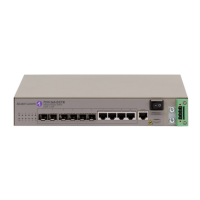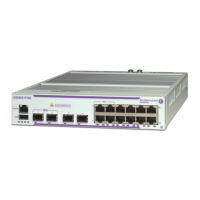MPLS and RSVP
7210 SAS M, T, X, R6, Mxp MPLS Configuration Guide Page 167
Interface Commands
interface
Syntax [no] interface ip-int-name
Context config>router>rsvp
Description This command enables RSVP protocol support on an IP interface. No RSVP commands are executed
on an IP interface where RSVP is not enabled.
The no form of this command deletes all RSVP commands such as hello-interval and subscription,
which are defined for the interface. The RSVP interface must be shutdown it can be deleted. If the
interface is not shut down, the no interface ip-int-name command does nothing except issue a
warning message on the console indicating that the interface is administratively up.
Default shutdown
Parameters ip-int-name — The name of the network IP interface. An interface name cannot be in the form of an
IP address. If the string contains special characters (#, $, spaces, etc.), the entire string must be
enclosed within double quotes.
Values 1 — 32 alphanumeric characters.
authentication-key
Syntax authentication-key [authentication-key | hash-key] [hash | hash2]
no authentication-key
Context config>router>rsvp>interface
Description his command specifies the authentication key to be used between RSVP neighbors to authenticate
RSVP messages. Authentication uses the MD-5 message-based digest.
When enabled on an RSVP interface, authentication of RSVP messages operates in both directions of
the interface.
A 7210 SAS M node maintains a security association using one authentication key for each interface
to a neighbor. The following items are stored in the context of this security association:
• The HMAC-MD5 authentication algorithm.
• Key used with the authentication algorithm.
• Lifetime of the key. The user-entered key is valid until the user deletes it from the interface.
• Source Address of the sending system.
• Latest sending sequence number used with this key identifier.
A 7210 SAS M RSVP sender transmits an authenticating digest of the RSVP message, computed
using the shared authentication key and a keyed-hash algorithm. The message digest is included in an
integrity object which also contains a flags field, a key identifier field, and a sequence number field.

